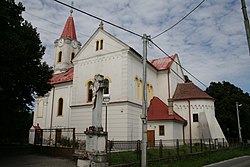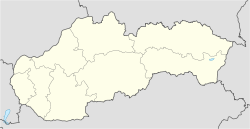world.wikisort.org - Slovakia
Jelka (Hungarian: Jóka) is a large village and municipality in Galanta District of the Trnava Region of south-west Slovakia.
Jelka
Jóka | |
|---|---|
Village | |
 Church of Saint John the Baptist | |
 Jelka Location of Jelka in Slovakia | |
| Coordinates: 48°08′35″N 17°30′09″E | |
| Country | Slovakia |
| Region | Trnava |
| District | Galanta |
| First mentioned | 1237 |
| Government | |
| • Mayor | Gabriel Kiš |
| Area | |
| • Total | 32.65[1] km2 (12.61[1] sq mi) |
| Elevation | 121[2] m (397[2] ft) |
| Population (2021) | |
| • Total | 4,026[3] |
| Demonym | Jókai |
| Postal code | 925 23[2] |
| Area code | +421 31[2] |
| Car plate | GA |
| Website | http://www.jelka.sk/ |
Geography
The municipality lies at an elevation of 123 metres and covers an area of 32.658 km2. It has a population of about 3,908 people.
History
In the 9th century, the territory of Jelka became part of the Great Moravia, in 11th century part of Kingdom of Hungary. In historical records the village was first mentioned in 1237. After the Austro-Hungarian army disintegrated in November 1918, Czechoslovak troops entered the area following cease-fire agreements with western powers. Later, newly created independent Hungary acknowledged full Czechoslovak sovereignty in their borders internationally by the Treaty of Trianon, apart of Hungary and Czechoslovakia signed also by France, Britain and USA. Hungarians respected their word until 1938, when, as agreed with Hitler, Jelka once more became part of Miklós Horthy's Hungary through the First Vienna Award. Hungary managed to keep this award until 1945 when Czechoslovak administration restored. From 1945 until the Velvet Divorce, it was part of Czechoslovakia. Since then it has been part of Slovakia.
It was also the birthplace of Rebbe Chaim Koenig.
Genealogical resources
The records for genealogical research are available at the state archive "Statny Archiv in Bratislava, Slovakia"
- Roman Catholic church records (births/marriages/deaths): 1732–1906 (parish A)
- Lutheran church records (births/marriages/deaths): 1701–1896 (parish A)
- Reformated church records (births/marriages/deaths): 1784–1910 (parish A)
See also
- List of municipalities and towns in Slovakia
References
- "Hustota obyvateľstva - obce [om7014rr_ukaz: Rozloha (Štvorcový meter)]". www.statistics.sk (in Slovak). Statistical Office of the Slovak Republic. 2022-03-31. Retrieved 2022-03-31.
- "Základná charakteristika". www.statistics.sk (in Slovak). Statistical Office of the Slovak Republic. 2015-04-17. Retrieved 2022-03-31.
- "Počet obyvateľov podľa pohlavia - obce (ročne)". www.statistics.sk (in Slovak). Statistical Office of the Slovak Republic. 2022-03-31. Retrieved 2022-03-31.
External links
На других языках
[de] Jelka
Jelka (ungarisch Jóka) ist eine Gemeinde in der Westslowakei mit 3946 Einwohnern (Stand 31. Dezember 2020).- [en] Jelka
Другой контент может иметь иную лицензию. Перед использованием материалов сайта WikiSort.org внимательно изучите правила лицензирования конкретных элементов наполнения сайта.
WikiSort.org - проект по пересортировке и дополнению контента Википедии